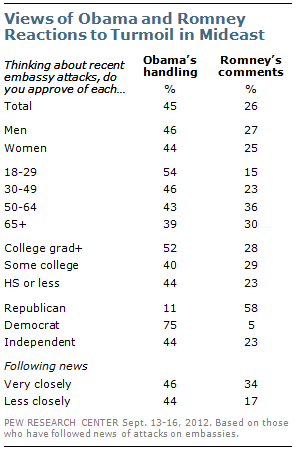Public Opinion and the Political Fallout of the Embassy Attacks

More on:
The Pew Research Center is out with a new poll on American reactions to last week’s attacks on the U.S. embassies in Cairo and Libya. Contrary to speculation that the attacks would hurt President Obama politically—speculation that likened Obama to Jimmy Carter and the Iranian hostage crisis--Pew’s results suggest that at least among people following the story—the attacks have done more to hurt Governor Romney.
I put “at least among those following the story” in italics, because Pew only asked people who said they had been following the news out of the Middle East—or 43 percent of the people they surveyed—what they thought about Obama’s and Romney’s handling of the crisis. Of that subsample, 45 percent approved of Obama’s handling of the situation and 36 percent disapproved. Conversely, 26 percent approved of Romney’s comments on the situation and 48 percent disapproved. (For the statistically inclined, the margin of error for the Middle East news subsample was 3.9 percentage points.)
As the table below shows, Obama had higher approval scores than Romney on the embassy attacks across all demographic/political groups except for Republicans. Also, the independents that both parties are trying to win over in November were almost twice as likely to give Obama a thumbs up (44 percent) than Romney (23 percent).

Do these results mean that the embassy attacks don’t threaten Obama’s reelection chances? Not exactly. Remember, Pew didn’t ask the 57 percent of Americans who weren’t paying close attention to Middle East news last week how they assessed Obama’s and Romney’s reactions. The fact that people lack information doesn’t mean that they lack opinions. Such so-called low information voters might have soured on Obama despite not knowing the facts, or perhaps because they don’t know the facts.
Beyond that, the story of the embassy attacks may be far from over. If they continue or even escalate, if U.S. diplomats are kidnapped or killed, or if Obama says something impolitic (think “you didn’t build that”) voters could revise their assessments.
But the Pew results, limited as they are, provide a useful reminder that bad news overseas doesn’t necessarily damage a president’s political chances. For a president to pay a price, the public needs to care about the issues, believe that the president is negligent or culpable for the event, conclude that he mishandled the response, or decide that the event in question validates his rival’s preferred policies.
That last factor explains why the steady drumbeat of bad news out of Afghanistan, including the killing of four U.S. soldiers by a member of the Afghan security forces yesterday, has yet to do Obama much political harm. With nearly seven in ten Americans saying they want out of Afghanistan, Romney’s criticisms that the White House is moving too fast on withdrawal and hints that he might keep U.S. troops in Afghanistan longer alarms rather than wins over disaffected voters.
More on:
 Online Store
Online Store
